Catholic Social Teaching
The Church's social teaching is a rich treasure of wisdom about building a just society and living lives of holiness amidst the challenges of modern society. Modern Catholic social teaching has been articulated through a tradition of papal, conciliar, and episcopal documents. Principles of Catholic Social Teaching
The Catholic Church and Immigration
The Catholic Church in the United States has been closely involved on issues related to immigration for over 200 years. This video highlights the efforts that the Church has undertaken in the past and continues to do so in the present. Advocating on behalf of immigrant communities and providing pastoral support is central to the Church’s work. For more information regarding what the Church is doing today, please visit the Migration and Refugee Services website:
What Can You Do To Help?
Become aware of important information on the rights of everyone living in the U.S under the U.S. Constitution.
What Is Catholic Social Teaching?
Our God is a God of justice. He is not some distant, fun uncle in the universe, but the very ground of our being and involved and concerned for each of his creations. He knows us by name and loves us!
Every human being is an imago Dei –– a creature made in the image and likeness of God (Gen. 1:26). The Catholic Church proclaims that human life is sacred and that the dignity of the human person is the foundation of a moral vision for society. This biblical foundation, the Catholic Church has spoken up and down the centuries through apostles, popes, priests, and laypeople to help us move towards creating a truly just society; these assembled writings and teachings are broadly called “Catholic Social Teaching.”
The Church’s teachings don’t fall into simplistic political categories of “left” and “right.” For instance, we must advocate against abortion and assisted suicide but also for immigration reform and attention to the poor. We must be against the abuse of the environment and for the protection of the family. Like the very tension of Jesus Christ (both God and man), we balance all our efforts in the effort to be integrated both within ourselves and in our pursuit of the common good of society.
We have been destined for higher life and union with God. As we conform better to Christ, the more we are transformed and are able to transform our world.
Welcome the Stranger – 2025
As members of our multi-cultural parish community, the St. Francis of Assisi VOICE Social Justice Ministry CORE Team offers the following for your consideration and prayer.
Every immigrant and refugee has a dignity as a human person. Christ taught that we are called to love our neighbor and recognize their gifts and that love for each other creates continual growth for all. The Scriptures of the Old Testament, which we accept as part of our legacy, very frequently remind the Hebrew People how foreigners were to be accepted among them. Catholic Social teaching insists on the dignity of every person. Every human being has a gift to offer.
Our United States Catholic Bishops have recently come out very strongly reminding the American People of these realities and how immigrants must be treated with justice. (They have repeatedly called for reform of the immigration and refugee laws to make them just but at the present time our Congress is unable to make changes)
The Catholic Bishops have five immigration principles which inform the Church’s teachings on migration:
- Persons have the right to find opportunities in their homeland
- Persons have the right to migrate to support themselves and their families,
- Sovereign nations have the right to control their borders,
- Refugees and asylum seekers should be afforded protection, and
- The human dignity and human rights of undocumented migrants should be respected. (Strangers No Longer, 33-38 USCCB).
THINGS YOU CAN DO TO HELP
Below are specific actions which you can take to help with this issue:
- Continue to pray members of our community consider the Seven Principles of Catholic Social Teaching when addressing this issue. (See below)
- Support positive legislation and humane policies which minimize family separation, and the continuance of birthright citizenship.
- Support the continuance of an asylum policy for individuals in danger of economic, physical, and or psychological persecution.
- Support local and state programs providing legal assistance and other programs protecting or assisting people at the margins of our society.
- Promote “Know Your Rights” programs.
Principles of Catholic Social Teaching
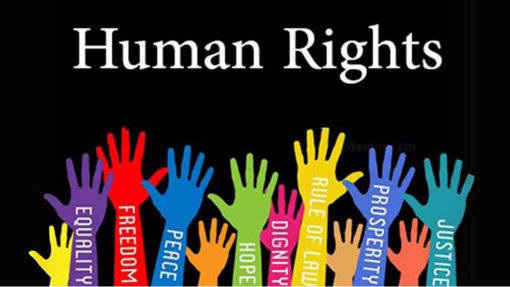
Rights and Responsibilities
The Catholic tradition teaches that human dignity can be protected and a healthy community can be achieved only if human rights are protected and responsibilities are met. Therefore, every person has a fundamental right to life and a right to those things required for human decency. Corresponding to these rights are duties and responsibilities–to one another, to our families, and to the larger society.
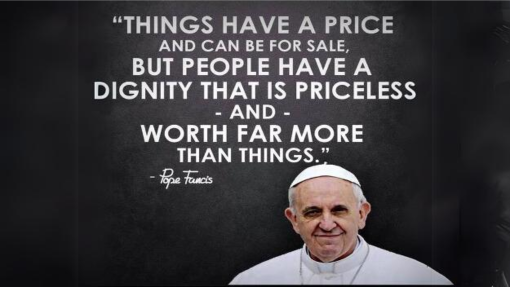
Life and Dignity of the Human Person
The Catholic Church proclaims that human life is sacred and that the dignity of the human person is the foundation of a moral vision for society. This belief is the foundation of all the principles of our social teaching. In our society, human life is under direct attack from abortion and euthanasia. The value of human life is being threatened by cloning, embryonic stem cell research
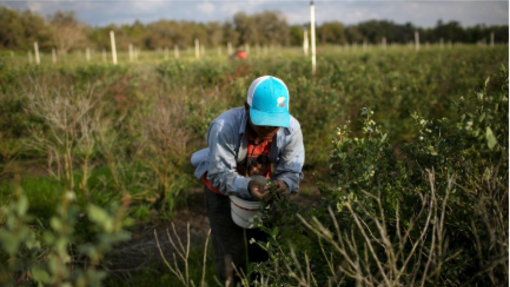
The Dignity of Work and Rights of Workers
The economy must serve people, not the other way around. Work is more than a way to make a living; it is a form of continuing participation in God’s creation. If the dignity of work is to be protected, then the basic rights of workers must be respected–the right to productive work, to decent and fair wages, to the organization and joining of unions, to private property, and to economic initiative
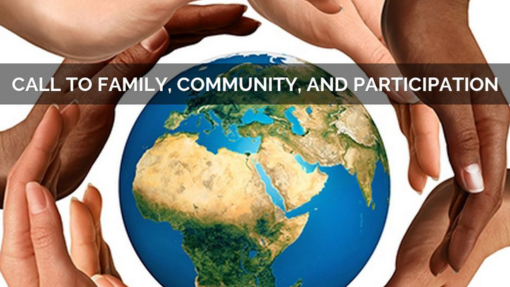
Call to Family, Community, and Participation
The person is not only sacred but also social. How we organize our society — in economics and politics, in law and policy — directly affects human dignity and the capacity of individuals to grow in community. Marriage and the family are the central social institutions that must be supported and strengthened, not undermined. We believe people have a right and a duty to participate in society, seeking together the common good and well-being of all, especially the poor and vulnerable.

Care for Creation
We show our respect for the Creator by our stewardship of creation. Care for the earth is not just an Earth Day slogan, it is a requirement of our faith. We are called to protect people and the planet, living our faith in relationship with all of God’s creation. This environmental challenge has fundamental moral and ethical dimensions that cannot be ignored.
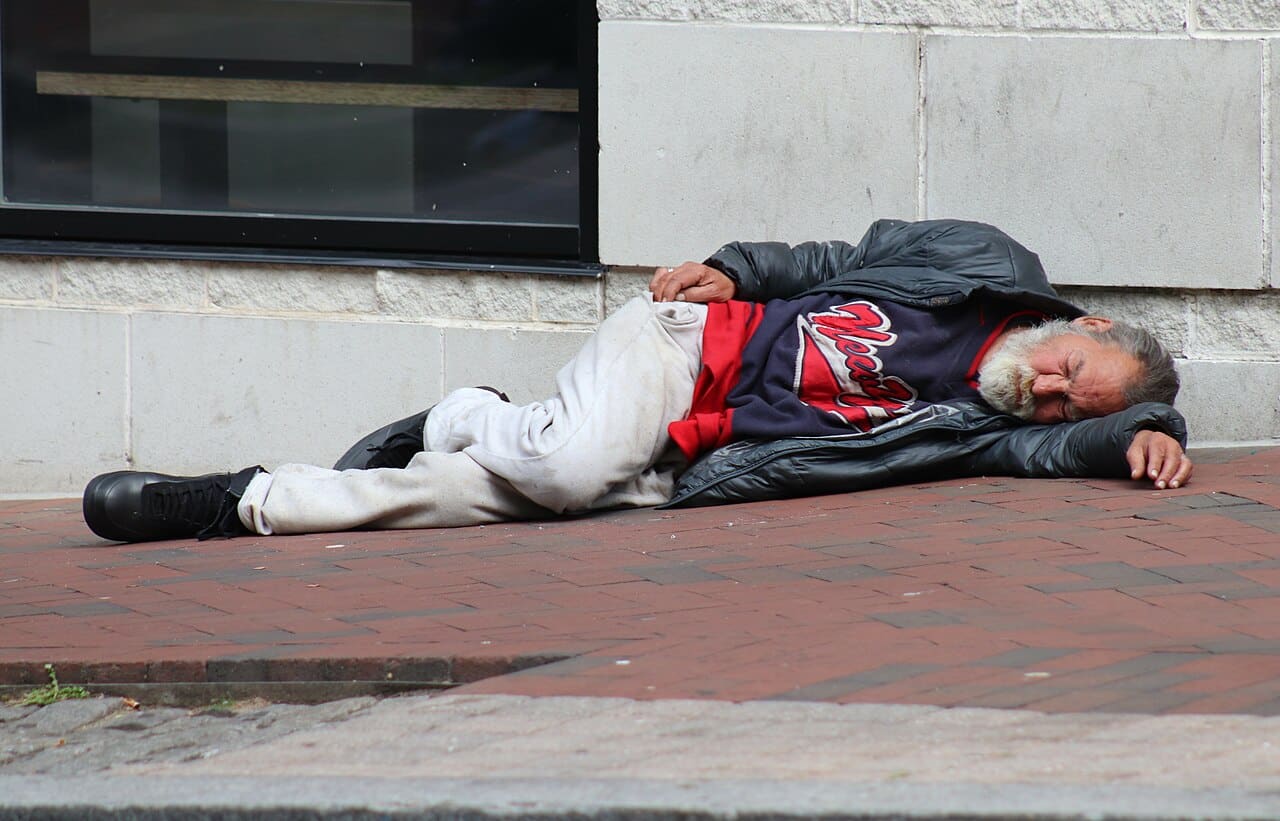
Options for the Poor and Vulnerable
A basic moral test is how our most vulnerable members are faring. In a society marred by deepening divisions between rich and poor, our tradition recalls the story of the Last Judgment (Mt 25:31-46) and instructs us to put the needs of the poor and vulnerable first

Solidarity
We are one human family whatever our national, racial, ethnic, economic, and ideological differences. We are our brothers and sisters keepers, wherever they may be. Loving our neighbor has global dimensions in a shrinking world. At the core of the virtue of solidarity is the pursuit of justice and peace. Pope Paul VI taught that if you want peace, work for justice.1 The Gospel calls us to be peacemakers. Our love for all our sisters and brothers demands that we promote peace in a world surrounded by violence and conflict.